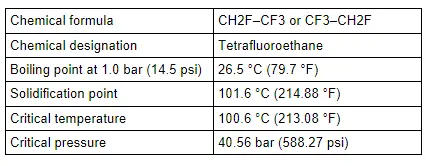Audi Q5: Refrigerant R134a
Refrigerant R134a Physical Data
Vehicle air conditioning systems make use of the vaporization and condensation process. In this case, one works with a substance which boils easily, designated as refrigerant.
The refrigerant used is tetrafluoroethane R134a, which boils at -26.5 ºC (-15.7 ºF) at a vapor pressure of "1 bar (14.5 psi)" (absolute pressure corresponds slightly to the ambient pressure).

Critical Point
The critical point (critical temperature and critical pressure) is that above which there is no longer a boundary between liquid and gas.
A substance above its critical point is always in the gaseous state.
At temperatures below the critical point, all types of refrigerant in pressure containers exhibit both a liquid and a gas phase, for example there is a layer of gas above the liquid.
As long as both liquid and gas are present in the container, the pressure is governed by ambient temperature. Refer to → Chapter "Refrigerant R134a Vapor Pressure Table "vapor pressure table".
 Note
Note
Different types of refrigerant are never to be mixed. Only the refrigerant designated for the corresponding A/C system may be used.
Refrigerant R134a Environmental Information
- R134a is a fluorocarbon and contains no chlorine.
- R134a has a shorter atmospheric life span than refrigerant R12.
- R134a does not damage the ozone layer. The ozone depletion potential is zero.
- The greenhouse potential of R134a (Global Warming Potential = GWP) is approximately 1430 (the GWP of carbon dioxide = 1). To reduce the influence of the greenhouse effect of the refrigerant R134a, the European commission has committed that a vehicle from the 01/01/2017 with refrigerant in the vehicle A/C system with a GWP greater than 150 can no longer be placed on the market. A/C system in vehicles which were brought into the market through 12/31/2016 can until further notice be filled with refrigerant R134a and driven.
- The global warming effect of R134a is "10" times less than that of refrigerant R12.

